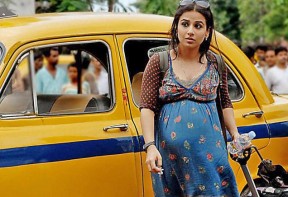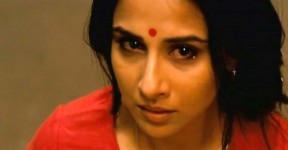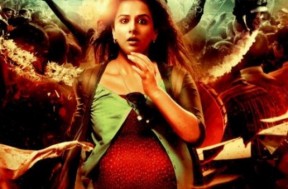
This is what Vidya Balan has done. She has distilled the Indian film heroine beyond her size, skin colour, weight, objectification in item songs and orchestrated stardom created around the din of endorsements and tiny roles in big budget films to performance. And presence. The kind that makes you look at a woman beyond her physicality and what is covering or uncovering it, into her soul where storms rage, a drop of joy spreads as if it were a water-colour tint on a sheet of hand-made paper, a smile is a dialogue, a frown is a question and a gaze is sometimes an embrace or a blow in the gut. When was the last time you saw a female Hindi film actor on screen and heard the word “power”even though no one had said it? When you heard whistles and claps in the hall because a woman is unarguably the hero of a film and can walk away with its weight on her square shoulders? Where you see her not just in the context of a mother goddess intent to win the battle against evil but also as Arjuna? You will make the connection when you see the film. She may be waddling through the film without obvious aggression but she is a woman to be feared.
Balan has not played by the rules of the industry. She is not obsessed with looking a certain way before the camera or off it. She has never worked with the big boys synonymous with 100 crore films and cliques of loyal heroines. As it turns out, she does not need to any more. Because Balan today is the only female actor in the country who is walking unexpectedly into forbidden zones cordoned off by a gender conscious industry that has believed for years that women don’t sell tickets and cannot be taken seriously as game changers. She is one serendipitously. And she has not done it in a hurry.
In Sujoy Ghosh’s Kahaani, she is in no panting hurry either to be the hero. She is just someone who carries a baby bump around in roomy maxi dresses, her hair casually messy, a water of bottle in her hands that she constantly sips from. She could be just another face in the crowd but then you see those eyes and something registers. A determination that won’t give away to arm twisting, danger, death or dead ends.

Her voice remains soft but watch her in the scene where she locks eyes with the absolutely, brilliant Nawazuddin Siddiqui and clangs against his aggressive, masculine verbosity. You know then, how powerful (yes, that word again) it is to be a woman who won’t give in. Or the scene where she wears the red bordered white saree and finds herself smothered in vermilion by scores of women celebrating Shakti. In a cinema where heroism is about rippling eight packs and flying kicks in slow motion and male stars unleashing explosions of testosterone, scenes like these redefine and change the gender of words like power and strength. Yes, those words again.
Balan has something more. Character and a centered sensuality that we have not seen since Smita Patil. How fortunate for her and for us that she is today grown bigger than the cookie cutter and films are being designed around her talent.
Sujoy Ghosh, the man who brought to life all that RD Burman means to him and to generations of his fans in the smart Jhankar Beats brings another passion to life in his fourth film. He pays a lavish, insightful, loving tribute to the quirky Kolkata, to the city’s musty alleys, its jostling sea of people, its spirit of community and contradictions. He makes you realise how important it is to root a story in a visual context, to know a city not just for its obvious landmarks but its secrets, its pace, its pauses, its noise, its centre of calm, its songs, its festivities and its moments of grief and mourning.
So to counter the anticipatory breathlessness before Durga Puja when the full bodied Goddess is being prepared for war in dim streets, and Pooja songs that the legendary RD Burman gifted this city every year are pouring out from every corner, we have the morgue where deep frozen bodies with tagged pale feet are being carried out on a stretcher.
And little moments of irony. Like when Balan’s Vidya Baghchi, is looking around at her dingy room at a pokey little guesthouse, her eye catches a man curled up on the street outside. And how refreshing to see and hear Bengali actors who blend seamlessly in the story rather than pretending to embrace a language, a milieu not their own.

Ghosh lovingly sketches his characters and brings them to alive palpably. The old owner of the guest house, the boy with the running water, the chai vendor, the genial, potbellied cop stumbling over the absent B in Vidya, the old man who paints Durga idols but once was a police informer and the absolutely adorable Parambrata Chattopadhyay as Rana who with his wide eyed innocence is drawn to a lone woman looking for her missing husband in an unfamiliar city and then begins to notice a bit more and discovers a silent adoration, a naive protectiveness within. He is a rookie cop not yet corrupted or hardened by the system and there are little insights into his life. The routine phone call he gets from his mother (who we never see) to check on him when he is commuting in a tram at the end of a challenging day. The sudden awareness of the fact that he is now reacting to more than the story Vidya is living but to her femininity, the stray locks of hair across her face, her warmth as a woman.
Ghosh also contrasts the genial Bengali with the uncouth cop from Delhi who has no time for niceties, who blows smoke in the face of a pregnant woman, uses cuss words and can sacrifice innocents as collateral damage in the interest of what he considers to be the larger picture. Nawazuddin Siddiqui is an absolute scene stealer. His eyes are sharp, cynical, bitter. His face set in grim lines of cruelty and there is not a beat that he misses in creating a character that owns the screen every time he appears. What an absolutely commanding, delightful actor and here is to more of him in films that respect real, unvarnished talent.
We must also mention that smiling assassin who strikes cold fear in your heart every time he folds his hands to greet a potential victim. And there is Kolkata again .. captured like an impressionist painting by Setu’s cinematography and Namrata Rao’s editing. The festive lights being strung across streets, the goddess being decked, the instant drama when lucchis meet hot oil, a million moments compressed in frame and after frame.
And the story that moves fast and sometimes loses you but is still absorbing till the last frame. Does the climax work? I am not sure. It was a bit hurried and in a way incredible but I would recommend this film because it slays not just the demons in the story but also many notions about a routine Hindi film. This is a trip to a new city of narrative possibilities. Watch it. Even if its just for Vishal Shekhar’s score, Amitabh Bachchan’s poignantly meaningful Ekla Chalo Re and Usha Uthup summing it all up with a throaty rendition of the city of joy as a Khwaishon Armaano Ka Achaar, a pickled, preserved combination of the past and the present. Go taste it.
Reema Moudgil is the author of Perfect Eight (http://www.flipkart.com/perfect-eight-9380032870/p/itmdf87fpkhszfkb?pid=9789380032870&_l=A0vO9n9FWsBsMJKAKw47rw–&_r=dyRavyz2qKxOF7YucnhfXw–&ref=4fe1efd1-de20-4a30-8eb8-ef81a99cb01f









excellent review Reema !
though i usually skip reading ur movie reviews. Now after reading this, i’ve to see this film.